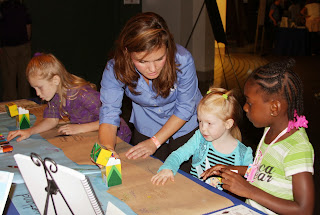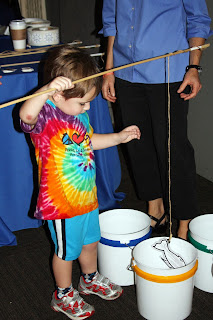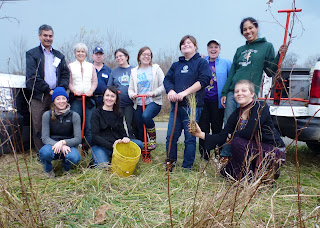Earlier this month IISG and several other organizations participated in Great Lakes Awareness Day at Shedd Aquarium. The event featured 10 interactive exhibits that introduced visitors to Great Lakes issues and showed them what they can do keep the Lakes healthy.
IISG science writer Anjanette Riley had this to say about the event:
 “To put it bluntly, Great Lakes Awareness Day was a huge success. There was maybe only a moment or two during the 3-hour event that exhibits weren’t crowded with people ready to learn more about aquatic invasive species, habitat restoration, and pollution from unwanted medications and unnecessary lawn care products. In the back-lit glow of the aquarium’s Water of the World galleries, children and adults became detectives on the hunt for aquatic invaders, saw how pollutants from streets and lawns flow into waterways with the help of a three-dimensional model, tested their knowledge of pharmaceutical pollution, and drew pictures of plants and animals important to Great Lakes health. Perhaps the biggest hit of the day was Spin-Fish-Win, an aquatic invasive species (AIS) trivia game.
“To put it bluntly, Great Lakes Awareness Day was a huge success. There was maybe only a moment or two during the 3-hour event that exhibits weren’t crowded with people ready to learn more about aquatic invasive species, habitat restoration, and pollution from unwanted medications and unnecessary lawn care products. In the back-lit glow of the aquarium’s Water of the World galleries, children and adults became detectives on the hunt for aquatic invaders, saw how pollutants from streets and lawns flow into waterways with the help of a three-dimensional model, tested their knowledge of pharmaceutical pollution, and drew pictures of plants and animals important to Great Lakes health. Perhaps the biggest hit of the day was Spin-Fish-Win, an aquatic invasive species (AIS) trivia game.
No matter what part of the event they joined in on, though, these Shedd visitors were clearly interested in talking about important Great Lakes issues–sharing what they know and asking questions about what they didn’t. People I talked with were particularly interested in learning more about Asian carp, asking questions like “what makes them so bad,” “what can we do to stop their spread,” and even “can’t we just eat them?” Visitors were also surprised to learn about the impact pharmaceuticals have on fish and other aquatic organisms and wanted to know how they could safely rid their cabinets of unwanted medicines. And a father and his son took advantage of an AIS art contest to clear up rumors they had heard about some invaders and get up to date on the newest species knocking on the Great Lakes’ door.
 Joining IISG staffers at the event were teachers and students from area schools who came to share what they are doing in their communities to protect water quality and aquatic wildlife. LaToyia Gilbert and her students talked about bringing medicine disposal ‘dos and don’ts’ to citizens and pharmacy technicians in Gary, IN.
Joining IISG staffers at the event were teachers and students from area schools who came to share what they are doing in their communities to protect water quality and aquatic wildlife. LaToyia Gilbert and her students talked about bringing medicine disposal ‘dos and don’ts’ to citizens and pharmacy technicians in Gary, IN.
Latoyia was inspired to create this project based on what she learned at the recent Great Lakes B-WET workshop. Jim Doyiakos and students from Amundsen High School introduced visitors to the risks of invasive species. And Ronald Hall’s 41st Street Beach Eco Warriors from Evergreen Academy Middle School shared their experiences picking up trash and monitoring water quality at Chicago’s 41st Street Beach.
 Thanks to a Shedd Aquarium teacher workshop going on that same day, some of the people who stopped by the exhibits were also teachers looking for ways to bring Great Lakes science into their classrooms. Many of these teachers took pictures of the displays or copies of the handouts so they could replicate the activities later. Others sought advice from teachers manning exhibits about potential stewardship projects they could do with their students. One teacher who helped with the event even asked if it could be repeated in the spring so her students could present their own projects.”
Thanks to a Shedd Aquarium teacher workshop going on that same day, some of the people who stopped by the exhibits were also teachers looking for ways to bring Great Lakes science into their classrooms. Many of these teachers took pictures of the displays or copies of the handouts so they could replicate the activities later. Others sought advice from teachers manning exhibits about potential stewardship projects they could do with their students. One teacher who helped with the event even asked if it could be repeated in the spring so her students could present their own projects.”
GLAD was coordinated by IISG as part of a Center for Great Lakes Literacy regional initiative.
Fifteen educators took to the water yesterday for the annual Shipboard and Shoreline Science Workshop. Scheduled for this week (July 7-13), the workshop offers teachers an opportunity to sail aboard the Lake Guardian on Lake Ontario, conducting a variety of experiments and research processes. This hands-on experience, combined with collaborative meetings with their fellow teachers, will allow each participant to take new information and approaches back to their classrooms.
Among the fifteen participants on the cruise are teachers from Illinois, and two of them wrote in to tell us about what they hope to gain from this week’s experience on Lake Ontario.
Alex Valencic, a fourth-grade teacher at Wiley Elementary school in Urbana, Illinois, looks to bring more information about the interactions between plants, animals, weather, and people to his students and his curricula.
“I’ve taught professionally for five years, first as a substitute teacher and then in my current position for the past two years. My teaching experience involves all of the core subjects, including mathematics, science, literacy, and social studies.
I first learned about the Lake Guardian workshop through a friend who works with the Illinois-Indiana Sea Grant. Some of the major topics of study for fourth graders in Illinois include learning about ecosystems, particularly how plants and animals interact with their environments, weather and global climate, and inquiry-based research. It is my hope that I’ll gain some ‘real-world’ experience studying these issues on Lake Ontario. I would like to integrate the topics into my science curriculum and challenge students to use the information about Lake Ontario to guide their study of Lake Michigan (the Great Lake that borders Illinois). While my students will not be able to go to the Great Lakes to experience the hands-on learning themselves, they will be able to use the resources gained during this workshop in their inquiry projects.”
Jen Slivka, working in the Shedd Aquarium’s learning department, is looking forward to incorporating even more science-based information and research into the exhibits at the aquarium.
“As a learning specialist, I have had the opportunity to coach teachers on inquiry-based science, create professional development sessions, and work closely with teachers on creating stewardship and citizen science programs. I feel very lucky to work with students and teachers of varying backgrounds and pass along my passion for science and education!
Prior to joining the Shedd team, I taught first grade for five years in Plano, IL. My passion for science was ignited when I attended Aurora University to earn my Masters in Teacher Leadership and Elementary Math and Science. My experiences in my graduate work led me to apply for a program through Shedd, called Teacher Field Experience: Biology in the Bahamas. Through this program, I was able to dive deep into marine environments and scientific research, first in Shedd’s classroom, and then firsthand in the Bahamas aboard Shedd’s research vessel, the R/V Coral Reef II. Through hands-on experience, I gained a greater understanding of data collection and analysis, how it applies to current scientific research and how to integrate it into my classroom curriculum. I quickly realized that teachers and educators can benefit greatly from unique professional development experiences and field work. My experiences on the Shedd’s research vessel created a desire in me to continue doing real, hands-on science, and inspire other educators to improve the science they do in their classroom. Last year I was fortunate enough to accept a learning specialist position at Shedd, which allows me the opportunity to connect with teachers all over the city of Chicago.
The Lake Guardian Sea Grant opportunity came at a perfect time. Shedd Aquarium recently unveiled a renovation of our Local Waters exhibit, titled At Home on the Great Lakes. Since Shedd is committed to education and conservation of the Great Lakes, I am thrilled with the opportunity to be able to board a research vessel and explore ecology, geology, geography, weather, and human impacts on Lake Ontario. Even though I was born and raised in Illinois, I feel that I have a lot to learn about the crucial role that the Great Lakes play in our world. I am looking forward to building my knowledge base on the Great Lakes by receiving firsthand experiences on a working research vessel. I am most looking forward to gaining new resources and discovering stewardship opportunities for students and teachers. Once I return, the knowledge and experiences I gain will be shared with the learning department, and will help to shape future programming at Shedd.”
Educators from Illinois, Indiana, and Wisconsin attended IISG’s workshop Nov. 9-10 to increase the presence of Great Lakes science in their classrooms and to improve student awareness of issues related to the Lakes.
Illinois-Indiana Sea Grant partnered with Chicago’s Shedd Aquarium and the National Park Service Great Lakes Research and Education Center and the Dunes Learning Center to host the workshops, which provided opportunities for teachers to engage in science and math data collection and hands-on field work. Educators previewed Sea Grant’s Greatest of the Great Lakes and Fresh and Salt curricula to familiarize themselves with the diverse range of learning formats to enhance their science, math, and engineering units, as well as activities from Great Lakes in My World by the Alliance for the Great Lakes. Also, as part of the new Center for Great Lakes Literacy, workshop attendees learned how to help protect and restore coastal areas in the Lake Michigan watershed through a variety of teaching methods.
All of the teachers who attended this year’s workshop were excited to learn about programs like the Alliance for the Great Lakes’ Adopt-a-Beach, as well as the many exciting student stewardship activities offered by the Shedd Aquarium, the Dunes Learning Center, and the Indiana Dunes National Lakeshore botanists. They also enjoyed the hands-on activities, including using the Enviroscape model to learn about point source/non-point source pollution, and learning how to use GLNPO’s Hydrolab water quality monitoring instrument.
The feedback and comments from teachers was especially positive. Said one attendee, “You’ve given me great ideas about water quality, drinking water, invasive and noninvasive species, habitat restoration, and stewardship projects I can provide for my kids to become ‘Great Lakes literate.’”
To learn more about IISG’s educational programs and resources, visit our education webpage, and follow us on Facebook and Twitter for more events, workshops, and information.
This Center for Great Lakes Literacy project was funded through a grant from the U.S. EPA Great Lakes National Program Office.
“To put it bluntly, Great Lakes Awareness Day was a huge success. There was maybe only a moment or two during the 3-hour event that exhibits weren’t crowded with people ready to learn more about aquatic invasive species, habitat restoration, and pollution from unwanted medications and unnecessary lawn care products. In the back-lit glow of the aquarium’s Water of the World galleries, children and adults became detectives on the hunt for aquatic invaders, saw how pollutants from streets and lawns flow into waterways with the help of a three-dimensional model, tested their knowledge of pharmaceutical pollution, and drew pictures of plants and animals important to Great Lakes health. Perhaps the biggest hit of the day was Spin-Fish-Win, an aquatic invasive species (AIS) trivia game.
Joining IISG staffers at the event were teachers and students from area schools who came to share what they are doing in their communities to protect water quality and aquatic wildlife. LaToyia Gilbert and her students talked about bringing medicine disposal ‘dos and don’ts’ to citizens and pharmacy technicians in Gary, IN.
Latoyia was inspired to create this project based on what she learned at the recent Great Lakes B-WET workshop. Jim Doyiakos and students from Amundsen High School introduced visitors to the risks of invasive species. And Ronald Hall’s 41st Street Beach Eco Warriors from Evergreen Academy Middle School shared their experiences picking up trash and monitoring water quality at Chicago’s 41st Street Beach.Thanks to a Shedd Aquarium teacher workshop going on that same day, some of the people who stopped by the exhibits were also teachers looking for ways to bring Great Lakes science into their classrooms. Many of these teachers took pictures of the displays or copies of the handouts so they could replicate the activities later. Others sought advice from teachers manning exhibits about potential stewardship projects they could do with their students. One teacher who helped with the event even asked if it could be repeated in the spring so her students could present their own projects.”


